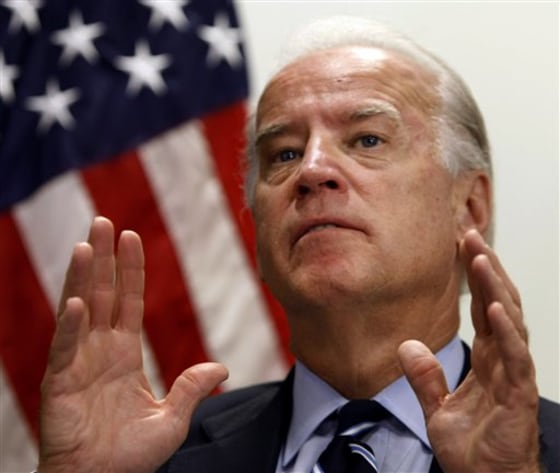Vice President Joe Biden will be tested on two fronts this weekend during the first foreign trip by a top Obama administration official.
Can he provide any insight into the White House's emerging strategy on Afghanistan and persuade allies to step up their assistance in that country and across the troubled Middle East? Can he curb his trademark bluntness as he strides onto the international stage in a new role and under the scrutiny of a curious world?
Biden, who planned to leave Friday for a security conference in Munich, Germany, has been a constant presence at President Barack Obama's side since the Jan. 20th inauguration. The Delaware Democrat who headed the Senate Foreign Relations Committee before becoming vice president has attended Obama's daily briefings on security and the economy, traveled with the president to high-profile events at the Pentagon to discuss the future of the wars in Iraq and Afghanistan, and made several trips to the State Department.
Each week he has a private lunch with Obama. He has used his new residence at the Naval Observatory, a few miles north of the White House, to host Secretary of State Hillary Clinton for breakfast.
White House senior adviser David Axelrod said Biden has been involved in all major discussions, from the economic stimulus package to foreign affairs.
"When he signed on, it was with the explicit understanding that he would function as a wise counselor to the president and that he would be deeply involved in the key decision-making and would have the kind of relationship where he could give his candid advice," said Axelrod. "And that's exactly the way it's worked."
Biden, 66, has said he intends to be "the last guy in the room" when Obama makes important decisions. That assertion would be particularly true in matters of national security, an arena where Biden reigned until just weeks ago through his Senate committee post.
His selection to attend the Munich conference taps into that expertise. The trip also is designed to show the United States' high-level commitment to working with allies on an array of security issues.
Wolfgang Ischinger, a former German ambassador to the United States who now heads the annual security conference, told reporters he considered it a "significant signal" that the White House picked Biden for the first trip outside the U.S. by a top official in the new administration. On his first foreign trip, Obama plans to visit Canada on Feb. 19.
The Munich conference, which routinely draws numerous heads of state, is expected this year to attract more than 300 participants, including official delegations from more than 50 countries.
Not only is Biden carving out his place in the new White House, he is signaling a key break from its predecessor.
Each day the vice president's office issues a daily schedule — something only very rarely seen during Dick Cheney's eight years on the job.
While photographs during the transition showed Biden and Cheney meeting graciously, the Democrat has made quips about their differences. Referring to Cheney's often heavy-handed forays into national security issues, Biden joked during the Democratic convention that "for all those people in government who are honoring their pledge to uphold the law and honor the Constitution, no longer will you hear the eight most dreaded words in the English language: `The vice president's office is on the phone.'"
At the same time, however, Biden has shown he can still shoot from the hip and stray from the official talking points. When he joked about Chief Justice John Roberts flubbing Obama's oath of office during the inauguration, Obama didn't crack a smile.
But when Biden told a television interviewer that high-paid business executives who received excessive bonuses should be tossed "in the brig," White House officials just laughed and chalked it up to Biden being Biden.
And when the often longwinded Biden began to speak at a train station rally in Wilmington, Del., with the Obamas en route to the inauguration, Obama aides — virtually in sync — all looked at their watches.
"How long do you think he'll go?" one of them joked.
Axelrod shrugged off any hint of concern, saying that "little hiccups" come with every public official.
"I think that part of his strength is his bluntness," he said. "I would not criticize Joe. And I would not bridle him. One thing about Joe Biden is that he speaks from his gut, and I think that's one of the reasons why he's effective."
